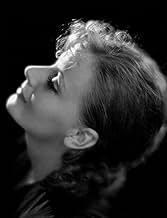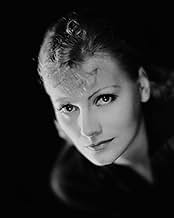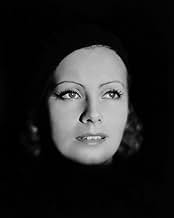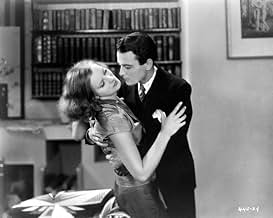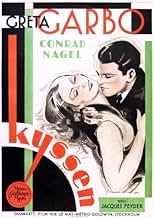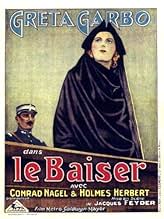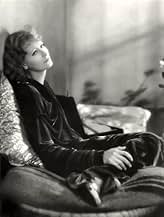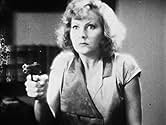AVALIAÇÃO DA IMDb
6,8/10
1,3 mil
SUA AVALIAÇÃO
Adicionar um enredo no seu idiomaAn unhappily married woman is caught up in scandal and murder when her affection toward a young man is misinterpreted.An unhappily married woman is caught up in scandal and murder when her affection toward a young man is misinterpreted.An unhappily married woman is caught up in scandal and murder when her affection toward a young man is misinterpreted.
- Direção
- Roteiristas
- Artistas
Symona Boniface
- Gossip in Museum
- (não creditado)
Allan Cavan
- Prison Warden
- (não creditado)
André Cheron
- Prosecutor
- (não creditado)
Carrie Daumery
- Party Guest
- (não creditado)
Ruth Feldman
- Scrubwoman
- (não creditado)
Lee Phelps
- Tour Guide
- (não creditado)
Philip Sleeman
- Lounge Lizard
- (não creditado)
- Direção
- Roteiristas
- Elenco e equipe completos
- Produção, bilheteria e muito mais no IMDbPro
Avaliações em destaque
"The Kiss" happens about midway into the movie ... Greta Garbo gives young admirer Lew Ayres a friendly kiss goodbye as he's about to leave town, Ayres, who cannot control his infatuation with the beautiful Garbo, goes in for another, less platonic kiss, at which point Garbo's husband sees them from afar and goes berserk. A fight amongst the three ensues, gets carried into another room where the door is shut to us, the audience, and we hear a shot. Garbo's husband is dead, but who did it?
Prior to the "kiss" moment, we've seen Garbo and her lover (Conrad Nagel) in a torturous romance ... they both love each other madly but Greta doesn't see any way out of her loveless marriage. In the meantime, Lew Ayres follows Greta around like a puppy dog; he's an 18-year-old completely infatuated with the beautiful married lady.
The latter half of the movie deals with the investigation of the husband's death, Greta's arrest, and her trial where she is defended by Nagel who in addition to being her former lover is also a lawyer.
I won't give away the outcome of the trial, but I will say that the jury believes it is Person A who did it and after the trial we learn it was Person B.
The musical score to this flick was absolutely horrible. I especially could have done without the "Romeo and Juliet" theme that was played every time the flick wanted to telegraph Greta's and Conrad's love to the audience.
Despite the score, this was a very enjoyable silent movie. I find some silents tedious, others quite well done. "The Kiss" definitely falls into the latter category. Worth watching.
Prior to the "kiss" moment, we've seen Garbo and her lover (Conrad Nagel) in a torturous romance ... they both love each other madly but Greta doesn't see any way out of her loveless marriage. In the meantime, Lew Ayres follows Greta around like a puppy dog; he's an 18-year-old completely infatuated with the beautiful married lady.
The latter half of the movie deals with the investigation of the husband's death, Greta's arrest, and her trial where she is defended by Nagel who in addition to being her former lover is also a lawyer.
I won't give away the outcome of the trial, but I will say that the jury believes it is Person A who did it and after the trial we learn it was Person B.
The musical score to this flick was absolutely horrible. I especially could have done without the "Romeo and Juliet" theme that was played every time the flick wanted to telegraph Greta's and Conrad's love to the audience.
Despite the score, this was a very enjoyable silent movie. I find some silents tedious, others quite well done. "The Kiss" definitely falls into the latter category. Worth watching.
Greta Garbo's last silent film finds her unhappily married to Andres Randalf, tearfully fending off the advances of old boyfriend Conrad Nagel and letting young and callow Lew Ayres steal A Kiss from her. Ayres is the son of Holmes Herbert who is her husband's business partner complicating things even more.
You can't blame Ayres though. In that last silent film Garbo is certainly at her most alluring and she carries the film off beautifully.
Ayres is thinking with his male member and he's at an age where there is more tendency to do that. When Randalf catches him with Garbo he starts beating on the kid as any jealous husband would. He gets shot for his troubles and Garbo is arrested. She also shields young Ayres telling him to leave the premises.
This is where Nagel comes in. Even without dialog as per usual in a courtroom scene he does well in putting over the dramatic impact of the trial. All actors love courtroom drama and Nagel gets some good innings in here.
I have to say though, French forensics leave a lot to be desired if they are manipulated in the way they are.
In the hands of a lesser actress The Kiss would have been melodramatic claptrap. But Garbo can make anything look positively poetical.
You can't blame Ayres though. In that last silent film Garbo is certainly at her most alluring and she carries the film off beautifully.
Ayres is thinking with his male member and he's at an age where there is more tendency to do that. When Randalf catches him with Garbo he starts beating on the kid as any jealous husband would. He gets shot for his troubles and Garbo is arrested. She also shields young Ayres telling him to leave the premises.
This is where Nagel comes in. Even without dialog as per usual in a courtroom scene he does well in putting over the dramatic impact of the trial. All actors love courtroom drama and Nagel gets some good innings in here.
I have to say though, French forensics leave a lot to be desired if they are manipulated in the way they are.
In the hands of a lesser actress The Kiss would have been melodramatic claptrap. But Garbo can make anything look positively poetical.
In star Greta Garbo's silent films especially, I think the stories are secondary to the images. They tend to be similarly melodramatic romances about adultery and love triangles and the surrounding scandals and tragedies. This one is more of a love rectangle, with Garbo's husband and the characters played by Conrad Nagel and Lew Ayres all trying to possess her. It's a generic formula, especially for the vehicles of MGM's star Garbo. Yes, there's a mystery element, but that's none too appealing, either. There's even dinner-party and courtroom scenes, and, of course, her husband is an old rotund businessman. The title cards are gushy, and the musical score, including the love theme from Tchaikovsky's "Romeo and Juliet," is unoriginal. Yet, the narrative does focus in some interesting and different ways on Garbo's image, and this is yet another lovely-looking late silent film, as Garbo's 1920s MGM productions tend to be. It's fortunate that Garbo, with her foreign accent, was the last of the studio's stars to transition to talkies--this being the last silent film of both Garbo and MGM--because they're some of the most deliberately gorgeous pictures of the era. They're far superior to the awkward early talkies concurrently being made by others.
Appropriately, "The Kiss" begins with Garbo and one of her lovers in a French art gallery; from there, the film itself is a piece of visual art. Much of that is the glossy close-ups of Garbo's face, but there's an emphasis on shots of her walking and riding away from men in this one, too. There are several overhead establishing shots, superimposed images and dolly-shot transitions. The best moving camera shot is in the assault scene, with the camera pulling back after the door closes. The gunshot and phone ringing are also a better use of sound effects than in most contemporary talkies. There are two flashback scenes of this incident as narrated, or imagined, by Garbo--one is a lie and the other, presumably, is the truth. Both are filmed differently and from different angles than the first instance. The Art Deco sets are impressive, too--mainly for Garbo's home. The abstract skyscrapers design on her bedroom wall is a standout. Additionally, there's the motif of Garbo's image: Ayres wants a photograph of her, the newspapers print her image, the courtroom artists draw it, while the overall film and machinery of MGM's star making focuses on creating it. In this case, that machinery is partly of European imported artists, including Garbo herself, the director and the writer. The transition to talkies would surrender much of such foreign talent, although, fortunately, not Garbo.
With about an hour runtime, this is a relatively-brief feature and taut. For instance, when the husband has his wife tailed, it's to establish his jealous suspicions, which are sure to foreshadow later events. And when we're shown "Chekhov's gun," expect it to be fired by the end.
Appropriately, "The Kiss" begins with Garbo and one of her lovers in a French art gallery; from there, the film itself is a piece of visual art. Much of that is the glossy close-ups of Garbo's face, but there's an emphasis on shots of her walking and riding away from men in this one, too. There are several overhead establishing shots, superimposed images and dolly-shot transitions. The best moving camera shot is in the assault scene, with the camera pulling back after the door closes. The gunshot and phone ringing are also a better use of sound effects than in most contemporary talkies. There are two flashback scenes of this incident as narrated, or imagined, by Garbo--one is a lie and the other, presumably, is the truth. Both are filmed differently and from different angles than the first instance. The Art Deco sets are impressive, too--mainly for Garbo's home. The abstract skyscrapers design on her bedroom wall is a standout. Additionally, there's the motif of Garbo's image: Ayres wants a photograph of her, the newspapers print her image, the courtroom artists draw it, while the overall film and machinery of MGM's star making focuses on creating it. In this case, that machinery is partly of European imported artists, including Garbo herself, the director and the writer. The transition to talkies would surrender much of such foreign talent, although, fortunately, not Garbo.
With about an hour runtime, this is a relatively-brief feature and taut. For instance, when the husband has his wife tailed, it's to establish his jealous suspicions, which are sure to foreshadow later events. And when we're shown "Chekhov's gun," expect it to be fired by the end.
This isn't the best Garbo silent ever made, but it was the last, and it was also the final silent film made by MGM. What makes this film good is the combination of Garbo's acting and the cinematography here. Movies like this and Sunrise make me somewhat sad that the silent film era ended, because what could be done creatively with the camera was lost from this point until the early 30's once the problems of the static camera got worked out and the novelty of sound at the expense of everything else wore off.
Garbo convincingly plays the sympathetic yet no-longer-in-love wife when in the presence of her husband (Anders Randolf), the longing lover who wishes to defy convention and just leave her marriage behind regardless of the consequences when with André Dubail (Conrad Nagel), and the knowledgeable "older" woman who is enjoying the attention she is getting when with the very young and naive Pierre Lassalle (Lew Ayres). Whenever she is alone she has no trouble conveying which of these three moods she is in. The story is a very good tale of tortured romance with a little bit of mystery thrown in towards the end, but the main attractions are the romance and the beautiful and creative shots. The only thing really annoying is the original Vitaphone score that went along with the movie. With all of the other subtle expression going on in this film, the choice of the theme song from "Romeo and Juliet" to convey the feelings between Garbo and Nagel every time they shared a scene just seemed a bit over the top.
Garbo convincingly plays the sympathetic yet no-longer-in-love wife when in the presence of her husband (Anders Randolf), the longing lover who wishes to defy convention and just leave her marriage behind regardless of the consequences when with André Dubail (Conrad Nagel), and the knowledgeable "older" woman who is enjoying the attention she is getting when with the very young and naive Pierre Lassalle (Lew Ayres). Whenever she is alone she has no trouble conveying which of these three moods she is in. The story is a very good tale of tortured romance with a little bit of mystery thrown in towards the end, but the main attractions are the romance and the beautiful and creative shots. The only thing really annoying is the original Vitaphone score that went along with the movie. With all of the other subtle expression going on in this film, the choice of the theme song from "Romeo and Juliet" to convey the feelings between Garbo and Nagel every time they shared a scene just seemed a bit over the top.
In Lyons, Irene Guarry (Greta Garbo) is not happy with her marriage with the old businessman Charles Guarry (Anders Randolf) and is in love with the young lawyer André Duball (Conrad Nagel). Irene knows that the jealous Charles will never give the divorce to her; therefore they decide to stop seeing each other since she does not want to be an unfaithful wife and defy the convention. André also decides to move to Paris. One day, Irene knows the eighteen year-old college student Pierre Lassalle (Lew Ayres) in a party during his vacation and she learns that the youngster is infatuated with her. By the end of his vacation, Pierre asks a photo for Irene and she promises to give one to him. Meanwhile Charles has a meeting with Pierre's father Lassalle (Holmes Herbert) and discloses that he is on the verge of bankruptcy. Lassalle promises to help his friend and they schedule a meeting in the night. When Charles goes to the encounter, Pierre arrives at his home and asks for a goodbye kiss to Irene. Meanwhile Charles does not feel well and returns home, witnessing their kiss. Charles tries to kill Pierre and later the student arrives home and tells his father that Charles is dead. Irene is arrested accused of murdering her husband. What happened in Charles's office?
"The Kiss" is a melodramatic romance and the last MGM and Greta Garbo's silent film and the debut of Lew Ayres. The movie has beautiful shots, a mystery and Greta Garbor extremely beautiful. Despite being a silent film, MGM uses sound technology with a powerful orchestral soundtrack. My vote is seven.
Title (Brazil): "O Beijo" ("The Kiss")
"The Kiss" is a melodramatic romance and the last MGM and Greta Garbo's silent film and the debut of Lew Ayres. The movie has beautiful shots, a mystery and Greta Garbor extremely beautiful. Despite being a silent film, MGM uses sound technology with a powerful orchestral soundtrack. My vote is seven.
Title (Brazil): "O Beijo" ("The Kiss")
Você sabia?
- CuriosidadesMGM's last non-talking picture.
- Erros de gravaçãoIn the opening credits, the name André, Conrad Nagel's character, is spelled "Ardré."
- Versões alternativasMGM also released this movie without a soundtrack, as a totally silent film.
- ConexõesFeatured in MGM Parade: Episode #1.30 (1956)
Principais escolhas
Faça login para avaliar e ver a lista de recomendações personalizadas
- How long is The Kiss?Fornecido pela Alexa
Detalhes
Bilheteria
- Orçamento
- US$ 257.000 (estimativa)
- Tempo de duração1 hora 2 minutos
- Mixagem de som
- Proporção
- 1.33 : 1
Contribua para esta página
Sugerir uma alteração ou adicionar conteúdo ausente


